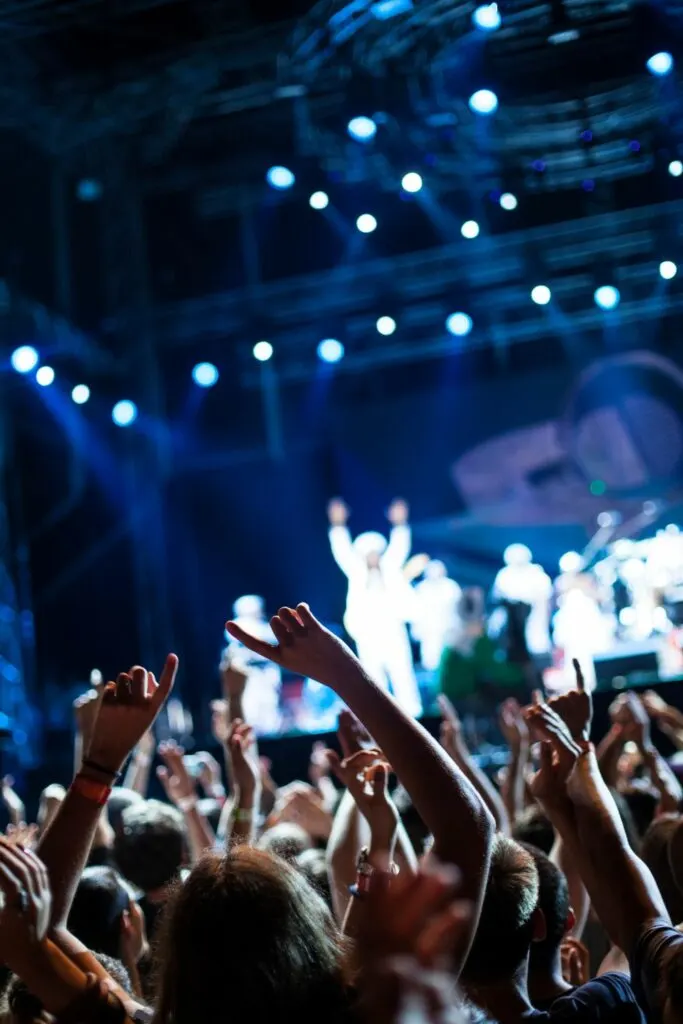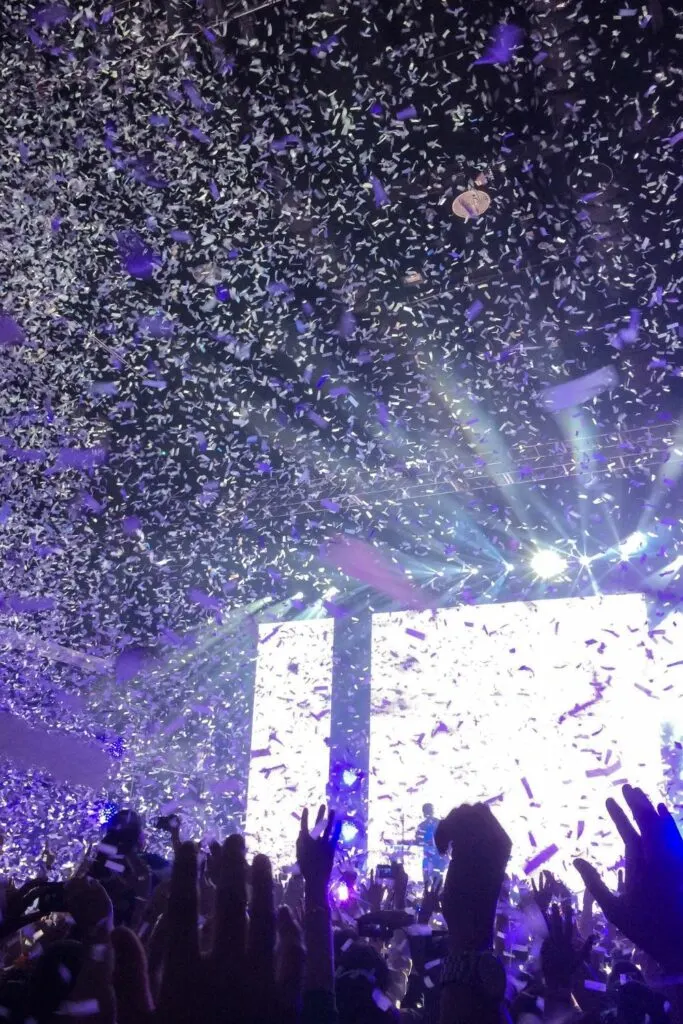Becoming a concert promoter is an exciting opportunity for individuals who are passionate about live music and enjoy connecting fans with the performers they love.

As a concert promoter, you play a vital role in organizing successful live events, from securing the perfect venue and booking talented performers, to creating a buzzworthy marketing campaign that draws in audiences. If you’re interested in getting involved in the music industry and have an entrepreneurial spirit, concert promotion might be the perfect career for you.
To get started in this rewarding field, it’s essential to learn the ins and outs of promotion and build a network of industry connections. While there isn’t a specific path to follow, gaining experience through internships and working closely with established promoters can help you hone your skills and develop valuable relationships. As you progress in your career, your ability to book increasingly bigger acts and venues will grow, ultimately leading to more successful and profitable events. Keep in mind that concert promotion requires dedication, determination, and an unwavering passion for music, so prepare to face challenges with a positive mindset as you embark on this dynamic career path.

Understanding the Role of a Concert Promoter
A concert promoter plays a crucial part in organizing and promoting live music events. They ensure that the right act is matched with the ideal venue and that the event runs smoothly. This section will delve into the roles and responsibilities, as well as the essential skills and personal attributes required for a successful concert promoter career.
Roles and Responsibilities
Concert promoters have various tasks they need to handle to ensure a successful music event. Some key responsibilities include:
- Booking the act and venue: Negotiating contracts with artists, their agents, and venues, ensuring that everything aligns with the event’s financial viability and target audience.
- Budget management: Developing a budget plan for the event, including costs for marketing, security, equipment rental, and artist fees.
- Marketing and promotion: Developing a promotional strategy to ensure maximum ticket sales, using diverse channels such as social media, posters, and radio advertisements.
- Coordinating event logistics: Managing transportation, accommodation, and staging for the artists, as well as overseeing security, staffing, and equipment setup.
- Ticket sales: Monitoring the selling process, including pricing, distribution, and ticketing platforms.
Skills and Personal Attributes
A successful concert promoter needs to possess specific skills and personal attributes. Some essential qualities are:
- Communication: Effective communication is critical for concert promoters since they will be dealing with various stakeholders such as artists, agents, venue managers, and marketing teams.
- Organization: Managing multiple details such as contracts, schedules, and event logistics requires excellent organizational skills. This includes the ability to prioritize tasks and meet deadlines.
- Patience: Things may occasionally go wrong or not according to plan in the music business. Concert promoters need to stay patient and calm under pressure, handling any unforeseen issues with poise.
- Networking: Building and maintaining relationships with industry professionals can lead to better event opportunities and chances to collaborate with popular artists or venues.
- Passion for music: Concert promoters should be passionate about the music business and be able to effectively promote different genres and acts.
By understanding the various roles and responsibilities of a concert promoter, along with the necessary skills and personal attributes, you will have a solid foundation for a successful career in this exciting industry.

Entering the Music Industry
Educational Background
While there is no specific degree required to become a concert promoter, pursuing higher education in relevant fields can provide you with a solid foundation. Degrees in music industry, music business, or marketing can prove helpful. Some universities and colleges offer specialized programs such as artist management, concert production, and music marketing. By obtaining a degree, you’ll gain valuable knowledge in music-related subjects as well as skills pertinent to the business side of the industry.
Internships and Entry-Level Jobs
To gain practical experience in concert promotion, seek out internships or entry-level jobs in the music industry. Positions within event management companies, talent agencies, or record labels can expose you to promotion-related tasks and help familiarize you with the industry’s dynamics. Internships can often lead to full-time opportunities if you excel and make a good impression on your employer. Additionally, working in entry-level jobs could provide an opportunity to learn from experienced professionals, allowing you to hone your skills before venturing out independently.
Networking and Building Connections
In the music industry, networking and building connections play a crucial role in establishing and advancing one’s career. To become a successful concert promoter, start by attending concerts, music festivals, and industry events where you can meet potential collaborators and clients. Be proactive in reaching out to musicians, venue owners, agents, and other industry insiders to build relationships.
Joining professional organizations can also help you expand your network by connecting with like-minded individuals who share your passion for the music business. Contribute to online forums, attend seminars and workshops, and stay up-to-date with industry news. By cultivating meaningful connections and staying informed, you’ll be better prepared to seize opportunities and launch a successful career as a concert promoter.
Planning and Executing a Concert
Choosing Performers and Venue
To plan a successful concert, you’ll need to select the right artists and venue. Research local and up-and-coming artists that would be a good fit for your target audience. Don’t forget to consider a variety of genres and styles, as well as any themes you want the concert to have. When looking for a venue, think about factors like size, accessibility, and the type of atmosphere you want to create. Remember, the venue can make or break the event, so choose a place that complements the artists and enhances the overall concert experience.
Setting a Budget and Negotiating Contracts
A key part of being a concert promoter is having a strong understanding of budgeting and negotiating contracts. Start by setting a budget for the event, including costs for the venue, artists, lighting, sound equipment, and any other expenses. This will help you manage costs effectively while ensuring a profitable concert.
When negotiating contracts, stay focused on striking a balance between fair compensation for the artist(s) and your financial bottom line. This might involve discussing performance fees, rider costs, and backline equipment needs. Don’t be afraid to negotiate, but always remain professional and respectful.
Marketing and Promotion
Once the artists and venue are secured, it’s time to start promoting the event. Effective marketing is crucial to draw in a large audience and generate buzz around the concert. Utilize various channels such as social media, email campaigns, and local event listings. If possible, work with the artists to promote the event and engage with their fan base. Consider partnering with local businesses or sponsors to help spread the word even further. Remember, the more people you reach, the more successful the event will be.
Managing Event Logistics
As a concert promoter, it’s your responsibility to handle the event logistics, such as transportation, lodging, and equipment setup. Ensure that all aspects of the concert run smoothly and without a hitch.
- Transportation: Coordinate transport for the artists, their crews, and any necessary equipment. If lodging is needed, book nearby accommodations to minimize travel time.
- Lighting and Sound: Work with the venue and a professional production crew to set up the stage, lights, and sound equipment to create the perfect atmosphere for the concert. This might also involve renting additional equipment, like a backline, depending on the artists’ requirements.
- House Concerts: If you’re organizing a house concert, make sure the space can accommodate the expected audience size and is set up for an intimate, memorable experience.
By properly planning and executing each aspect of the concert, you’ll be well on your way to becoming a successful concert promoter. Stay organized, communicate effectively, and most importantly, have fun with the process!
Essential Business and Financial Skills
Project Management
As a concert promoter, strong project management skills are vital for overseeing the various aspects of an event. This includes coordinating with artists, venues, and vendors. One effective way to manage these tasks is to utilize spreadsheets and project management tools for organization and collaboration.
- Communication: Stay in regular contact with artists, their management, venue staff, and suppliers.
- Time management: Juggle multiple tasks and prioritize them effectively.
- Problem-solving: Be prepared to address any issues that may arise before, during, or after the event.
Business Management
In addition to project management, successful concert promoters need a strong foundation in business management. This includes:
- Budgeting: Accurately estimate costs and revenues, create and stick to a budget. Keep track of payments and fees to ensure profitable events.
- Marketing: Develop a comprehensive marketing strategy to target your audience and sell tickets. Use social media, advertising, and press releases effectively.
- Networking: Build relationships with artists, agents, venues, and suppliers to expand opportunities and establish a solid reputation in the industry.
Legal Matters
Lastly, it’s crucial for concert promoters to have a basic understanding of legal matters related to the industry. This includes drafting contracts that protect your interests and ensure mutual agreements between artists, venues, and suppliers are upheld.
- Licensing: Ensure all necessary permits and licenses are in place for the event.
- Insurance: Obtain proper insurance coverage for risks associated with your event (e.g., injuries, property damage, cancellations).
- Technical Aspects: Be knowledgeable about the legal and technical requirements of sound, lighting, and other production aspects to ensure a safe and successful event.
By developing these essential business and financial skills, you’ll be well on your way to becoming a successful concert promoter. Remember to stay organized, budget wisely, and stay informed about the legal aspects associated with live music events.
Marketing and Communication Strategies
Public Relations and Press Releases
One of the most important aspects of being a concert promoter is public relations. This includes building relationships with the media, influencers, and your target audience. To gain publicity for your events, you can write and distribute effective press releases to notify the media about your concerts. Utilize your strong communication skills to convey the event’s significance and create excitement.
Remember to personalize your press releases according to the media outlets you communicate with, and ensure that they are well-written and engaging. This will increase the likelihood of your event being picked up and published, attracting more attention to your concerts.
Social Media and Online Presence
In today’s digital age, having a strong social media and online presence is essential for concert promoters. Social media platforms like Instagram, Twitter, and Facebook allow you to directly reach your target audience, share updates, and engage with potential attendees.
Make sure to create a consistent and appealing aesthetic across your online platforms to reflect your brand and the events you promote. Regularly update your social media accounts with quality content, including behind-the-scenes footage, interviews, and countdowns to the events. Additionally, consider collaborating with influencers or musicians themselves to further increase your reach in the digital space.
Graphic Design and Promotional Materials
A picture is worth a thousand words, and in the world of concert promotion, visually-appealing graphic design can make all the difference. Strong visuals can catch the eye of potential attendees, making it crucial to invest time and resources into creating attractive and captivating promotional materials.
If you have design skills, you can use tools like Photoshop to create posters, flyers, and online advertisements. If you don’t, consider collaborating with professional designers to create the visuals for you.
When designing your promotional materials, always keep your target audience in mind, and ensure that your designs align with the event’s branding. Some things to consider when creating visuals include the event’s genre, venue size, and the artist’s reputation. These factors can help you create promotional materials that resonate with the event’s target audience and capture their attention, ultimately driving ticket sales and event success.
In conclusion, with the right mix of public relations, social media, and graphic design strategies, concert promoters can effectively market their events and attract larger audiences. By honing these skills and keeping the target audience in mind, promoters will be one step closer to achieving their goals in the ever-competitive music industry.
Growing and Sustaining a Successful Career
Collaborating with Industry Professionals
Building a fruitful career as a concert promoter requires strong relationships with industry professionals such as booking agents, talent buyers, and other event producers. Foster these connections to keep a continuous flow of opportunities coming your way. Collaborate with various partners to create unforgettable live music events and special events, which will enrich your portfolio and elevate your reputation within the industry. Remember that the concert promotion business is a people business, and being a skilled negotiator can make all the difference when finalizing deals.
Exploring Different Event Types
As a concert promoter, diversify your experience by working on a wide array of events, including festivals, tours, and concert productions. Embrace opportunities to get involved in event production for different genres and target audiences. Expanding your expertise in various types of live events will showcase your versatility and may lead to increased job opportunities and higher salary potential.
Staying Informed and Continuously Learning
To stay ahead in this competitive industry, it’s crucial to stay informed about the latest trends and developments in the music scene. Keep an eye on ticket sales data, monitor popular music blogs, and track industry news. By immersing yourself in the world of live events and concert promotion, you’ll hone your ability to predict and capitalize on upcoming trends.
Additionally, invest in your own continuous learning by attending industry conferences, workshops, webinars, and courses on relevant topics such as concert promotion strategies, financial management, and event production. This ongoing education will not only keep you up-to-date with industry best practices but also demonstrate your commitment to professional growth, further enhancing your appeal to potential collaborators and boosting your career prospects.
